Mike Birbiglia: Why PC Could Kill Great Art

The stand-up comic loves being able to observe life without fame getting in the way.
“I fly under the radar,” Birbiglia says. “I hope I’m never more famous than this.”
This might change, though, given his new career at a celebrated writer/director. The comedian’s second film, “Don’t Think Twice,” finds him digging into the world of improv comedy. It’s a scene he knows intimately, but the feature is about more than unscripted laugh lines.
“It uses improv as a metaphor for life,” Birbiglia says. “Collaboration is wonderful, but ultimately it’s every man for himself to some degree. Those moments of communion and community are wonderful, but you have to figure it out on your own.”
Birbiglia co-stars as Miles, an improv comic with the sketch players known as The Commune. They love their work, but it barely pays the bills. So when talent scouts from “Weekend Live” (think that really famous show on Saturday nights) come calling, it’s the chance of a lifetime. Only not every Commune member makes the cut.
Cue long-simmering jealousies which threaten to tear the tight-knit group apart.
RELATED: Jo Koy Says His Comic Mentors Couldn’t Exist Today
Those awkward moments happened in small part thanks to Birbiglia having a film already under his belt. His directorial debut, the 2012 comedy “Sleepwalk with Me,” drew impressive reviews.
“You have a certain bit of confidence [after your first movie],” he says. “You start to quell some of the insecurities of making a film that feel like other films … you start to say, ‘no, this film’s not gonna feel like other stuff.’”
The deeply personal “Sleepwalk with Me” was based on his one-man show of the same name. “Don’t Think Twice” offered a blank canvas for the emerging filmmaker.
“Here, all bets are off. It freed me up to be more honest,” he says. The new movie doesn’t track his own personal history. That proved liberating on a number of fronts. You can still see the comic peeking through all the same.
“A lot of the things that are in these characters are feelings that I’ve felt,” he says.
Birbiglia says improv is having a moment these days. That’s partly due to our appreciation for today’s best comic minds.
“There’s this thing with improv right now where you see the Tina Feys and Amy Poehlers and think, ‘how did they get so good?’” he says.
Those comics, along with Steve Carell, got their start in improv theater groups. It’s where Birbiglia honed his craft, too. He played with an improv group while studying at Georgetown University.
Improv isn’t just a place for future stars to fine tune their skills. Birbiglia thinks the art form matters on a deeply personal level. And he tells fellow improv comics precisely that when he visits them across the country.
Improv players can make a bigger impact on a crowd than “starring on a mediocre sitcom being ‘half-watched’ by 7 million people,” says Birbiglia, who gave out free improv classes as part of his new film’s promotional push. “I really believe that.”
“We think of [performing] as a narcissistic pursuit,” he says. “We can make people laugh who came into the theater thinking it was not possible to laugh. The world is so depressing.”
Sometimes I look at photos of myself and think “I wish that was someone else and then I would laugh at that person.”
— Mike Birbiglia (@birbigs) July 19, 2016
Political correctness is no laughing matter for many comics these days. It doesn’t directly impact Birbiglia, who rarely dabbles in politics and keeps his routine relatively clean. He still isn’t happy about the trend.
“People have a right to tell jokes, and people have the right be offended by jokes. Those two ideas aren’t mutually exclusive,” he says. “When you start to get into this territory of, ‘you can’t tell this joke’ or ‘you’re fired if you tell that joke,’ that’s when it gets sticky.”
He particularly feels for comics whose comedy club routines get magnified by social media.
“Technically, they were just saying it to that group of people in that room … they didn’t say it on a comedy special that is written and produced and thought through,” he says.
RELATED: PC Doc ‘Joke’ Vital to Free Speech
Comedy clubs matter all the same. They allow comedians to refine their acts, to work out the kinks. Paying customers often see works in progress, not the finished product.
“I workshop a lot of stuff on stage that’s not ready for prime time,” he says. Even while promoting “Don’t Think Twice” in Denver, Birbiglia ducked into the local Comedy Works to hammer out new material. After the short set, he sat at the bar taking notes on what worked best … and what needed to be cut.
He recently wrapped his “Thank God for Jokes” comedy tour. The material got nipped and tucked along the way, too.
“I would talk to people after the shows, ‘How did you feel about this piece?’” he says.
One response that concerned him came after a routine about the 2015 Charlie Hebdo terrorist attack. Radical Islamists killed 12 people at the French satirical magazine after it published cartoons critical of the Muslim Prophet Muhammad.
“Some people would say, ‘why do they have to write jokes about that?’ I go, well, they don’t have to, but we have to be careful not to be so precious with certain topics that we make it dangerous to talk about certain topics,” he says. “It’s also a dangerous path artistically. If we sanitize what we’re doing, we’re not gonna have great art any more.”


Unfortunately, one of the worst reviews I’ve read so far this year is for “Can We Take A Joke” by Matt Zeitz at rogerebert.com. Every possible left-liberal cliche justifying tightening the reins on free speech is used in this missive: http://www.rogerebert.com/reviews/can-we-take-a-joke-2016